- Home
- George Orwell
Essays
Essays Read online
George Orwell
Essays
PENGUIN BOOKS
IN ASSOCIATION WITH
Martin Secker & Warburg
PENGUIN BOOKS
George Orwell: Essays
Eric Arthur Blair (George Orwell) was born in 1903 in India, where his father worked for the Civil Service. The family moved to England in 1907 and in 1917 Orwell entered Eton, where he contributed regularly to the various college magazines. From 1922 to 1927 he served with the Indian Imperial Police in Burma, an experience that inspired his first novel, Burmese Days (1934). Several years of poverty followed. He lived in Paris for two years before returning to England, where he worked successively as a private tutor, schoolteacher and bookshop assistant, and contributed reviews and articles to a number of periodicals. Down and Out in Paris and London was published in 1933. In 1936 he was commissioned by Victor Gollancz to visit areas of mass unemployment in Lancashire and Yorkshire, and The Road to Wigan Pier (1937) is a powerful description of the poverty he saw there. At the end of 1936 Orwell went to Spain to fight for the Republicans and was wounded. Homage to Catalonia is his account of the civil war. He was admitted to a sanatorium in 1938 and from then on was never fully fit. He spent six months in Morocco and there wrote Coming Up for Air. During the Second World War he served in the Home Guard and worked for the BBC Eastern Service from 1941 to 1943. As literary editor of Tribune he contributed a regular page of political and literary commentary, and he also wrote for the Observer and later for me Manchester Evening News. His unique political allegory, Animal Farm, was published in 1945, and it was this novel, together with Nineteen Eighty-Four (1949), which brought him world-wide fame.
George Orwell died in London in January 1950. A few days before, Desmond MacCarthy had sent him a message of greeting in which he wrote: ‘You have made an indelible mark on English literature … you are among the few memorable writers of your generation.’
Bernard Crick is Emeritus Professor of Birkbeck, the University of London’s college for mature part-time students. He took early retirement in 1984 to live in Edinburgh and interest himself in ‘British Isles’ questions. Born in 1929, he was educated at University College London, the London School of Economics and Harvard. He lived for four years in North America before teaching at the LSE and then Sheffield University. His books include The American Science of Politics; the widely translated In Defence of Politics (Penguin 1964; revised edition, 1993); George Orwell: A Life, which was the Yorkshire Post Book of the Year for 1980; and Political Thoughts and Polemics. Joint editor of the Political Quarterly from 1965 until 1980, literary editor from 1991–2000, he has written for the Observer, the Guardian, the New Statesman and the Independent, and was chairman in 1998 of the government advisory committee whose report led to making Citizenship a new subject in the English national curriculum.
The footnotes in this edition are taken from the four-volume Collected Essays, Journalism and Letters of George Orwell edited by Sonia Orwell and Ian Angus.
Introduction: An Essay
The American critic Irving Howe has called Orwell ‘the greatest English essayist since Hazlitt, maybe since Dr Johnson’. So an introduction was perhaps always needed to this fine collection of Orwell’s longer, major essays and well-judged selection of the many shorter ones, if only to show that they are not merely pleasant appendages to his real books, but may well constitute his lasting claim to greatness as a writer. Orwell needs to be read as, at least, a considerable figure in this once-famous and specifically English tradition or genre of writing – even if behind all the English writers lurks the speculative curiosity of the benign father-figure of the essay, Michel de Montaigne, and his first great translator into English, John Florio. Even in Orwell’s lifetime two books of his essays were published, though it was easier to publish essays then than now. To argue the primacy of his essays may release some guilt and puzzlement among many who believe that Orwell is a great figure but cannot honestly say that any one of his books measures up to his fame.1
Kipling asked ‘What should they know of England who only England know?’ Lecturing to teachers of English in Czechoslovakia and Poland shortly after the collapse of Soviet power, I was moved to ask ‘What do they know of Orwell who only Animal Farm and Nineteen Eighty-Four know?’ But Orwell’s two last books, satires of very different kinds although fully consistent in meaning, almost alone gave him his international fame. Both books were promptly translated into many languages, and samizdat translations and smuggled copies were circulated in Poland, Czechoslovakia, Hungary and the Soviet Union. Orwell even wrote an introduction for a Ukrainian translation of Animal Farm in 1946 explaining his intention and who he was. Moreover, thanks to its reputation as a model of English plain style, Animal Farm soon became a set book for the advanced level examination of the Cambridge Proficiency in English Language, and so was openly used in language schools in South American dictatorships and throughout Africa. The censors read the text as though the pigs represented Russian Communism and nothing else, but students in Chile had no doubt that their General Pinochet was a big pig too, and in grim Paraguay resemblances between ‘Napoleon’ and General Stroessner were silently noted. An Arab dissident imprisoned in Zanzibar in the 1960s by President Julius Nyerere spent part of his time inside translating Animal Farm into Swahili; but when released he found that there was already a Swahili version, produced at Nyerere’s own command. Satire can mean different things to different people.
Readers in Eastern Europe and Russia also thought that the satires were simply aimed at Communism. The books were, without any doubt, primarily aimed at Communism, but not at Communism alone; like in much great satire, the targets were wider and manifold. Consider, in Nineteen Eighty-Four, Julia’s job in Minitrue: she worked a machine churning out pornographic novels to corrupt and debase the proles, to whom the Party also surreptitiously gave, for the same grand purpose, alcohol, drugs, ‘films oozing with sex’ and ‘rubbishy newspapers containing almost nothing but sport, crime and astrology’. That was not the behaviour of the parties of either Stalin or Hider: they propagandized, enlisted and mobilized the masses. The target for that barb is surely closer to home: Julia’s job must be a savagely Swiftian satire on the British Press and reading public (whether the debauched or the debauchers). Orwell mocked the power-hungry wherever they were; the Communist Party was only the worst case. In any case, it is in the nature of imaginative satire for the targets to become wider over time. A good cap fits many heads, or can be made to do so with only a little stretching. Swift’s Gulliver’s Travels has outlived the politics of his age: we laugh at minor, Lilliputian rulers who think they are big and powerful, and we curse the clumsy giants of Brobdingnag who don’t notice the small folk on whom they are treading.
If my friends in Eastern Europe had known Orwell as an essayist, known the speculative, humorous, mockingly provocative man, they might have read Nineteen Eighty-Four less literally and more as satire than as prophecy, seen it as part of – was it Brecht who said, or am I inventing? Perhaps it was Orwell himself – ‘the laughter of free men’, a potent weapon against tyranny and oppression, whether domestic or political. But to demote Orwell from prophet to essayist, or perhaps to promote him from minor novelist to great essayist, means facing certain difficulties in reading essays in general, his in particular. There is a price to be paid for Eric Blair’s literary strategy of creating (or perhaps, more precisely, letting evolve) the adopted persona of George Orwell the plain, blunt, honest man – a friend not of ‘the people’, certainly not of ‘the proletariat’, but of ‘the common man’. There are dangers in Orwell’s much-praised plain style. One can tell lies or spin stories in monosyllables and simple sentences.
Orwell chose to write in the plain style for the very reason tha
t he thought it the best way to reach the common reader and to convey truths. He saw the common reader as potentially the idealized ‘common man’ of Thomas Jefferson and Immanuel Kant (with perhaps a dash of Jean Jacques Rousseau too): a creature of common sense and decency, neither servile nor needing servants, who could do most things with his own hands and who wore any formal learning lightly. The common man was the best hope for civilization, rather than proletarian man or aristocracies or élites of any kind. Orwell tried to follow in the footsteps of Charles Dickens and H. G. Wells by writing, for both political and literary reasons, for those whose only university had been the public library. His chosen public was not the professional middle class or the intelligentsia but that lower-middle class who had only had secondary education, together with the self-educated working class. Although he was fully conversant with modernist, even futurist literature (as shown by his good understanding of and sympathy with Joyce’s Ulysses, Henry Miller’s Tropic of Capricorn and Zamyatin’s We), he deliberately avoided, in all his pre-war novels but one, those devices of modernism which, to his way of thinking, had begun to make the modern novel inaccessible to the common man – books by intellectuals for intellectuals, needing a university degree in English Literature to be understood. The only exception was his early, unhappy experiment, A Clergyman’s Daughter, in which each chapter attempted a different style and perspective. In fact, to judge by the sales of his pre-war novels (never more than three or four thousand), Orwell failed to reach the common man at all – until the fame and notoriety of Animal Farm and Nineteen Eighty-Four.
Critical opinion in Britain comes increasingly to value Orwell as an essayist, if one uses that term broadly to include criticism, long book reviews, column journalism and short polemics as well as conventional essays and the digressive, serio-comic passages in The Road to Wigan Pier and The Lion and the Unicorn (printed here as an essay, although strictly speaking a short polemical book or long pamphlet).2 Consider this famous passage from the first essay in this volume, ‘Why I Write’ (1946):
What I have most wanted to do throughout the past ten years is to make political writing into an art. My starting point is always a feeling of partisanship, a sense of injustice. When I sit down to write a book, I do not say to myself, ‘I am going to produce a work of art.’ I write it because there is some lie I want to expose, some fact to which I want to draw attention, and my initial concern is to get a hearing. But I could not do the work of writing a book, or even a long magazine article, if it were not also an aesthetic experience. Anyone who cares to examine my work will see that even when it is downright propaganda it contains much that a full-time politician would consider irrelevant. I am not able, and I do not want, completely to abandon the world-view that I acquired in childhood. So long as I remain alive and well I shall continue to feel strongly about prose style, to love the surface of the earth and to take pleasure in solid objects and scraps of useless information. It is no use trying to suppress that side of myself. The job is to reconcile my ingrained likes and dislikes with the essentially public, non-individual activities that this age forces on all of us.
The essay form well suited Orwell, as he slowly came to realize. But it can be misleading to place ‘Why I Write’ out of temporal order (following the four volumes of the 1968 Collected Essays, Journalism and Letters of George Orwell) for it was, at the time it was written, an afterthought in mid-career, not a premeditated manifesto or solemn statement of intent. Moreover, it arose simply as a response to an invitation to take part in a symposium on ‘Why I Write’ in Gangrel, a short-lived journal with a tiny circulation. The author was still making his way and had to seize almost any chance to get into print, some fortunate, many highly opportunistic. Too much should not be read into the choice of subject matter, nor yet into omissions.3
The essay is a peculiar but reasonably specific form of writing. It can be moral, didactic and serious, even propagandistic, up to a point; but it is not a sermon, it has more informality and flexibility; above all it leaves the reader in some uncertainty about what is going to be said next, how the discursive argument will develop; and the argument will not be conclusive or structured logically – an essay may be quite content to raise an issue, force it on a reader’s attention, but then to ruminate and speculate, neither to orate nor pontificate; above all it will seem personal not objective, will give a sense of listening to an extended conversation by an odd but interesting individual. An essay may refer to facts, evidence and authorities, but only in passing; it is not, like a legal advocacy, an ordered argument set out logically step by step. An essay speculates and enquires, as if the author is thinking aloud; it must not appear over-contrived, but rather appear to be a set of free associations made by a sensitive and well-stocked mind.
Orwell’s wish ‘to make political writing into an art’ led to a bold but carefully phrased claim for the originality of his essays on the ‘blurb’ or dust-jacket copy of his Critical Essays of 1946 (which must have been approved by Orwell, ever suspicious of publishers for creating misleading appearances):
In these essays Mr Orwell applies to writers as, diverse as Dickens, Kipling, Frank Richards and P. G. Wodehouse a new method of critical analysis. They are not political tracts, their main emphasis is literary, but they start out with the assumption that every writer is in some sense a propagandist and that subject-matter, imagery, even tricks of style are ultimately governed by the ‘message’ that the writer is trying to put across. This is the method which Orwell applies in the essays on Dickens, Wells, Kipling, Yeats, Dali and Koestler. But of special interest are the pieces dealing with the school stories in the Gem and Magnet, with seaside comic postcards, with the burlesques and comedies of P. G. Wodehouse and with the gangster stories of James Hadley Chase. In each of these Orwell demonstrates that what appears to be the very lightest of entertainment has a definable world-view and even a conscious purpose behind it, and that a book which has no literary value whatever may have the highest symptomatic importance. These essays are among the very few attempts that have been made in England to study popular art seriously.
The complete polemicist or propagandist knows exactly what he wants to say, but a natural essayist like Orwell, even when he sets out to write a polemic, will say, as he himself noted, much that is irrelevant. He stops to explore side issues, and enjoys the play of imagination and the actual act of writing too much ever to be either a reliable polemicist or a wholly objective sociologist.
Perhaps, however, by writing and thinking in a more independent and entertaining manner than the paid party hack writing to order, the essayist or the true writer can actually, on some occasions, be the more effective polemicist. But not reliably so. Orwell once said that ‘a writer cannot be a loyal member of a political party’. I have italicized ‘loyal’, for at the time he wrote it he was a member of a political party, albeit a fairly small one – the Independent Labour Party (ILP)4. Indeed, he set himself up to be ‘the conscience of the Left’, someone who delighted in rubbing his own cat’s fur backwards – much like the football supporters who bellow at their own side, ‘What a load of rubbish! Sell ‘em!’ For instance, when writing a column in Tribune (a left-wing magazine, more or less pro-Labour) during the war, he set his readers a cunningly baited trap. One week he devoted almost the whole column to rabbiting on about what a good bargain was a sixpenny Woolworth’s rose. Angry letters rolled in and the usual high-minded threats to cancel non-existent subscriptions: ‘As our glorious Russian allies fight for their lives at Stalingrad how dare he …’; ‘Not what we want’; ‘Footling trivialities’; ‘Not serious’. Orwell replied that his idea of a just, egalitarian, classless society was not one in which great issues alone were discussed, but one in which there was time to sit and stare, to enjoy nature and leisure; such ideals must not be forgotten, especially in times of deadly crisis: they were part of his idea of the classless society. And he kept reverting to this theme, nagging or teasing his readers: ‘I had better not contin
ue too long on this subject, because the last time I mentioned flowers in this column an indignant lady wrote to say that flowers are bourgeois.’ ‘Some Thoughts on the Common Toad’ makes the same serious point more fully, in plain style and comic tone:
How many a time have I stood watching the toads mating, or a pair of hares having a boxing match in the young corn, and thought of all the important persons who would stop me enjoying this if they could. But luckily they can’t. So long as you are not actually ill, hungry, frightened or immured in a prison or a holiday camp, spring is still spring … the earth is still going round the sun, and neither the dictators nor the bureaucrats, deeply as they disapprove of the process, are able to prevent it.
Here Orwell plays a fine old central European cultural role, the ‘wise fool’, or if not always quite that, at least the Chaplinesque little fellow subverting the pomposity of both statesmen and intellectuals. And he implies, more profoundly, that human life must strike a balance between material progress (which he values as the basis of any hope for the poor and the dispossessed) and preserving nature. Today we would see a bit of a green one in his red.
Orwell’s two most famous books, though different in structure, are both written in the plain style, at times with almost monotonous monosyllabic intensity. But this does not prevent fundamentally different readings of them. Is Animal Farm a lament for the Revolution that failed, the betrayal by the pigs of the other animals, or a sad parable that all revolutions will fail because there is too much pig in us all? There is no doubt about the author’s intention, but sensible people have also read it in the second sense. Fellow British democratic Socialists (Orwell always capitalized the two terms thus) would want to label such a reading as that of ‘American Cold War warriors’, which is true enough; but this gloomy interpretation must have seemed the only one possible to readers under Communist oppression in Eastern Europe and Russia. Nineteen Eighty-Four also has only a seeming simplicity: the text has been read in a bewildering number of different ways. Some, for instance, read it as Orwell’s prophecy of what he thought was likely to happen in the Western world, but others see it as a satire exposing the pretensions, even the impossibility, of total power of any kind. Consider only the famous last passage:

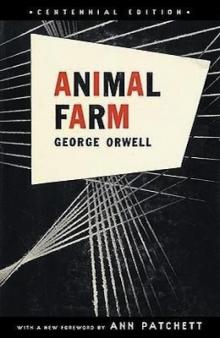 Animal Farm & 1984
Animal Farm & 1984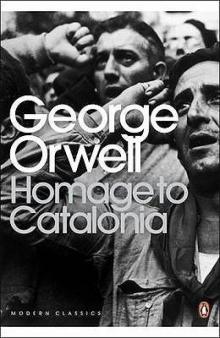 Homage to Catalonia
Homage to Catalonia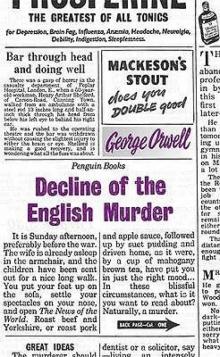 Decline of the English Murder
Decline of the English Murder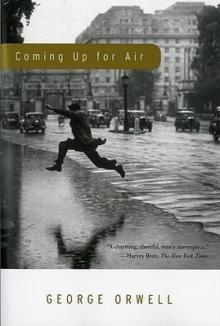 Coming Up for Air
Coming Up for Air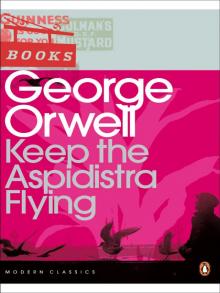 Keep the Aspidistra Flying
Keep the Aspidistra Flying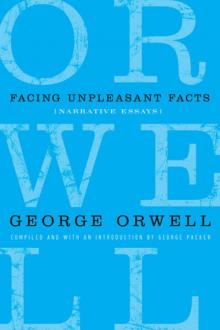 Facing Unpleasant Facts: Narrative Essays
Facing Unpleasant Facts: Narrative Essays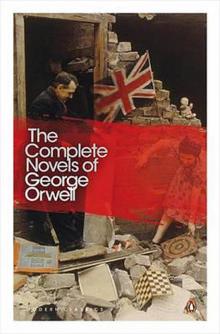 The Complete Novels of George Orwell
The Complete Novels of George Orwell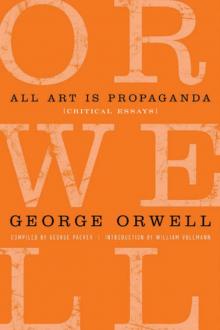 All Art Is Propaganda: Critical Essays
All Art Is Propaganda: Critical Essays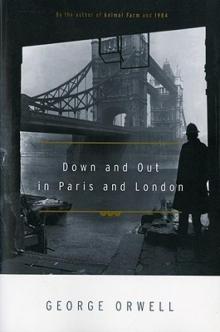 Down and Out in Paris and London
Down and Out in Paris and London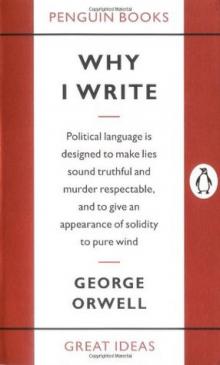 Why I Write
Why I Write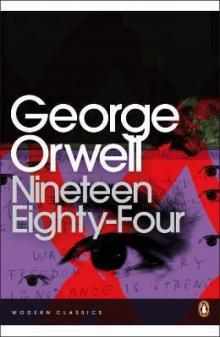 Nineteen Eighty-Four
Nineteen Eighty-Four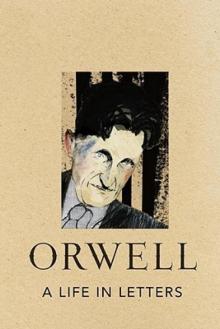 A Life in Letters
A Life in Letters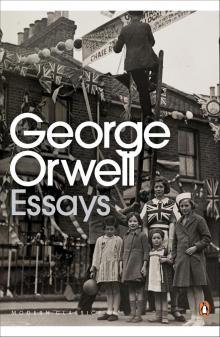 Essays
Essays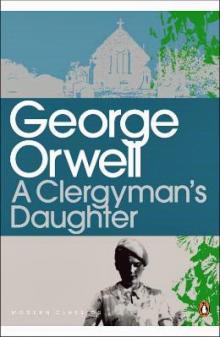 A Clergyman's Daughter
A Clergyman's Daughter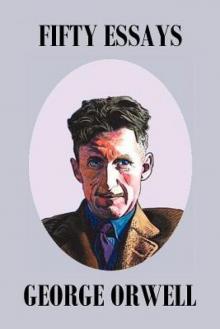 Fifty Orwell Essays
Fifty Orwell Essays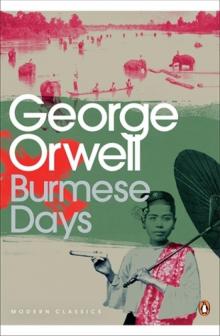 Burmese Days
Burmese Days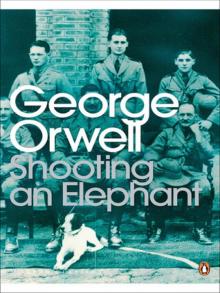 Shooting an Elephant
Shooting an Elephant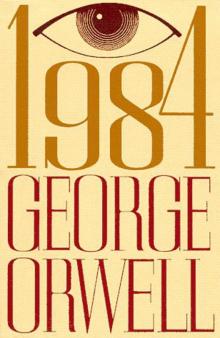 1984 (Penguin)
1984 (Penguin)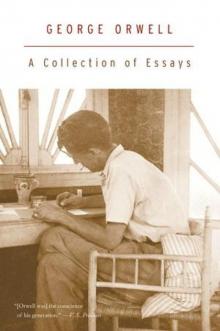 A Collection of Essays
A Collection of Essays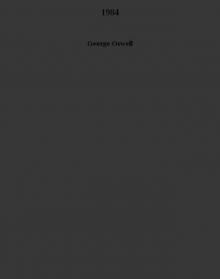 1984
1984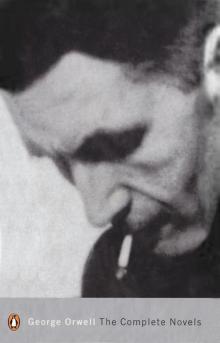 The Complete Novels
The Complete Novels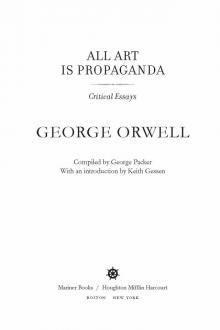 All Art Is Propaganda
All Art Is Propaganda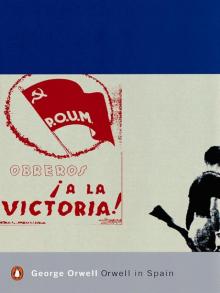 Orwell in Spain
Orwell in Spain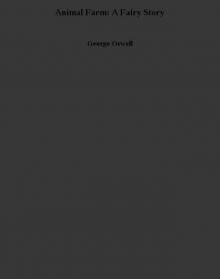 Animal Farm: A Fairy Story
Animal Farm: A Fairy Story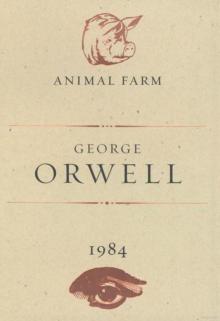 Animal Farm and 1984
Animal Farm and 1984